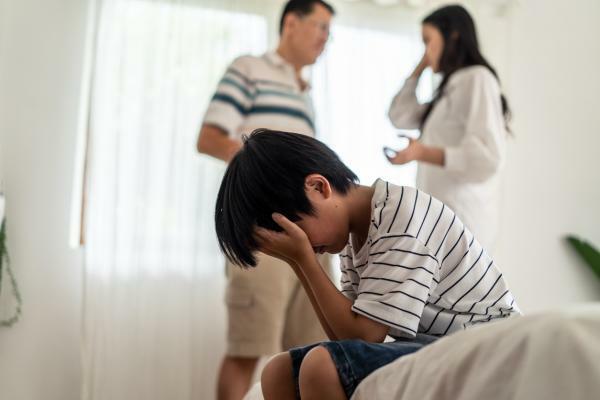
Today many people are afraid of not being in a relationship, either because they believe that they will never be able to have this type of relationship or because they think that they cannot be happy without one. This fear generates a limited conception of happiness, since this satisfaction is only associated with the love bond, and limits the possibilities of personal growth and development. If you want to learn about cultivating happiness outside of a couple and know how to be happy every day, keep reading this article from Psychology-Online: How to be happy alone: 15 keys.
Currently there is a tendency for people to suffer fear of loneliness and abandonment, caused in large part by emotional dependence. This fear is found especially in the area of affective relationships, in which many people find it difficult to learn to live without a partner.
These barriers may be due, on the one hand, to a lack of selfesteem, autonomy and security, as well as, on the other hand, the social pressure of the current context to have a partner and the hierarchy of relationships of romantic love, for which the couple's relationship is conceived as superior to the rest of affective ties, whether of friendship, family, etc.
These factors generate a affective dependence in people and promote the development of distorted beliefs or thoughts related to the fear of loneliness. These maladaptive patterns can be exacerbated after a recent breakup:
- Catastrophic thoughts: for those who believe that you will never meet another person and always feel alone.
- Dichotomous cognitions, “Black or white”: thoughts of all or nothing in the area of the couple, so it is thought that Without one you cannot achieve happiness or because you do not have a partner the person is not valid or enough.
- Thoughts of self-demand: the typical thought of "I want to be happy and I can't", on many occasions it is due to unrealistic and unrealistic expectations about happiness, which is why excessively high criteria are set.
- Filtering: type of distortion in which people focus only on some aspects of reality, completely ignoring the rest. In this case, as a measure of happiness, the person only considers whether or not they have a partner, omitting other relevant life factors.
How to be happy alone? To learn to be alone, the crucial step is to learn to distinguish loneliness from feeling lonely. It is not the same to be than to feel alone. Therefore, a reflection and differentiation about loneliness is necessary, since people can spend time alone physically and not feel lonely, while at other times even surrounded by people a person can be feel alone.

It is necessary to work and learn about how to be happy without a partner, since there is a culture of romantic love that is transmitted from childhood through the media and relationship patterns. Learn to be happy alone with the following keys that we provide you:
1. Identify your fears
To learn to be alone, first of all, analyze and evaluate what it is that you are really afraid of not being in a relationship, reflect about the causes of it, the factors that may have influenced this, what other fears you have overcome and how you did it, etc. You can make a list of specific situations that you fear facing without a partner.
2. Of construction
How to be happy without a partner? It is vital to stop considering that a person is alone because they are not in a relationship, since this is a limitation of thought that does not allow us to analyze and enjoy reality completely. Therefore, you can make a daily record of those people with whom you share moments and also note what they have contributed to you. This exercise can help you to realize that this belief is false and, therefore, to overcome it.
3. Value
How to be happy every day? Apart from making a record of those people with whom you interact, write down those aspects or positive feelings from day to day, what has been rewarding for you. In this way, it is easier to focus on the positive factors that we have in our lives and that we are unable to assess, blinded to the idea of lack of a partner.
4. know yourself
There are no rules to be happy, since each person is different and there is a great diversity of personalities and tastes. Because of this, it is advisable to spend some time introspection, discovering ourselves and identifying those activities that are rewarding and positive for us in order to put them into practice.
5. Take time
To learn to be alone, in addition to the above, pay attention to your emotional state, do not avoid what feel, analyze the origin of it, the different reactions and what strategies you can use to feel best. Knowledge of one's own emotions and self-care is a key factor in affective independence, for not depend on anyone to be happy.
6. Get out of your comfort zone
How to be happy alone? Explore, do new activities, set yourself new challenges and meet new people. All this will contribute to your self-esteem and security, will stimulate new positive aspects in your life and will allow you to learn and enjoy other facets that you did not know about yourself. If what is gratifying or pleasant is dispersed and expanded, the tendency to focus everything on a single point is reduced, in this case the couple. In the following article you will find how to get out of the comfort zone.
7. Reevaluate your concept of happiness
If your thought is "I just want to be happy", perhaps you need to analyze what your idea of happiness is and ask yourself if it is not exclusively focused on this area. Evaluate the other aspects of life, identify the positive points and those that you would like to change and set goals based on them.
8. Enjoy the solitude
If you are afraid of loneliness, expose yourself to it. One way can be through carrying out activities or tasks that are pleasant to us, such as going to the movies, to an exhibition, to eat, etc. Loneliness does not mean being at home doing nothing, it can be rewarding. In this way there is a change in the concept of loneliness, a more positive approach. Try to do something you like once a week without company and in this way, start to enjoy solitude.
9. Travels
Once you are able to carry out activities in solitude and be able to enjoy this way, a great challenge can be to take a short trip without company. This will allow you to get out of your comfort zone, enjoy solitude, get to know yourself more, as well as meet and interact with other new people.
10. Appreciate the benefits
Rate the points in favor of learning about how to be alone; increased self-esteem and self-knowledge favor greater emotional independence from other people. Therefore, when we get together with another person we will do so because we really want to and because this other person brings positive things to our person and we will not do it from the fear of being alone and the avoidance of this loneliness.
11. Locate happiness
How to be happy alone? Relocate the source of happiness to yourself or yourself, not to other people. In this way, you have control over your own life and enjoyment, and other people complement it and accompany you in it. This way you will more easily surround yourself with people who contribute to your own happiness.
12. Appreciate yourself
Make a list of your strengths and pay attention to those small positive actions that you take on a daily basis. It can help you ask people close to you about your strengths, as well as it can help you discover aspects of yourself that you previously ignored. Here you will find others exercises to work self-esteem.
13. Focus on the present
It is important not to project the future from the present, it is a way to avoid catastrophic thoughts about never having a partner again. Focus on what you are experiencing right now and the positive aspects it has, that is, adopt an attitude mindfulness to live in the here and now.
14. Don't compare yourself
Focus on improving your life and enjoying it, growing as a person, pursuing your goals, and celebrating your successes. Focus on yourself and not on what others have or do.
15. Go to a professional person
A professional person can be helpful in addressing self-esteem, confidence, self-efficacy, in the restructuring of distorted thoughts and in the deconstruction of the emotional dependence.


